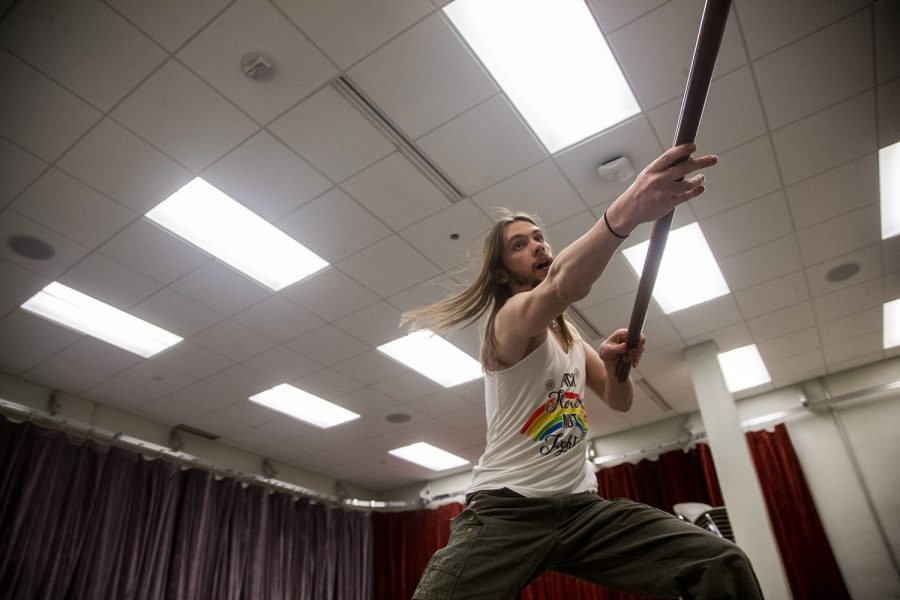Student Spotlight: Crafting the perfect fight
When he can’t use words on stage, Dante Benjegerdes uses his body and weapons to express himself.
UI Junior Dante Benjegerdes demonstrates stage combat choreography at the Theatre Building on Monday, March 25, 2019. Although a competitive niche, Benjegerdes plans to pursue stage combat professionally. (Alyson Kuennen/The Daily Iowan)
March 27, 2019
Wearing a white tank top reading “pick flowers, not fights,” University of Iowa junior Dante Benjegerdes wields a fake knife as he practices combat, hair flowing freely.
An item often used to ignite fear, he views the knife as a symbol of comfort.
Bitten by the theater bug at a young age, Benjegerdes was introduced to stage combat when he was cast in such shows as Treasure Island and The Hobbit. In the technique, actors learn choreography to create the illusion of fighting without hurting each other.
Since then, he has participated in various workshops in which he developed his faux fighting skills, ranging from Nebraska to Minnesota. Benjegerdes said he has high respect for those who master the physical form of theater.
“It takes a very special kind of person to say, ‘Listen, we’re going to pretend to kill each other, and we’re going to make sure we’re healthy and having fun while we’re doing it,’” he said. “There’s nothing quite like standing at the other end of a knife and working together to tell a story.”
Before engaging in a “fight,” Benjegerdes stretches his body to prevent injuries, taking as many safety precautions as possible so he won’t harm his partner. After learning the choreography, he implements acting, which helps move the story along.
“[Stage combat] is to acting what physics is to math,” he said. “It’s taking theory and principles and defining them in a very specific context.”
Benjegerdes said body movement is a crucial part in telling a story on stage, acting as a substitute for talking.
“It’s the same reason we need musicals,” he said. “When you can’t talk, you sing, and when you can’t sing, you dance. There are times in our everyday lives in which words fail, and you need to have people who have skills to make sure you can say what you need to say.”
In order to create effective stage combat, he said, communication and consent are essential components. As a means to keep communication strong without words, he heavily relies on eye contact and breathing through his partner to make sure the actor is all right.
By depending on consent from his partners, Benjegerdes said, stage combat has helped him in certain social situations.
“You can’t do it without consent,” he said. “It is explicitly required in every action that you do, in that I have asked whether this was OK, and you have said yes.”
Stage combat has allowed Benjegerdes to build trust with others, along with letting himself listen to viewpoints from other artists. With a heavy amount of physical contact, he has viewed stage combat as a source of healing.
“I’ve always considered my stage-combat courses to be negative semester hours because they feel like therapy to me,” he said. “I’m a really touchy-feely person. When you’re pretending to punch and wrestle with people, that’s a lot of human contact.”






